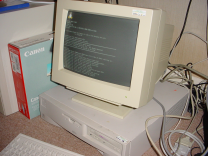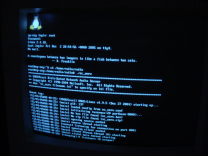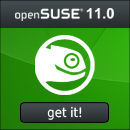About OP-EZY
OP-EZY was originally a hacking group for Local Networks, over time OP-EZY became a programming group. I set up this site for a bit of fun,and used it to learn how a web server works!
Using old (recycled) equipment, we have been able to create this site.
Our main server is our oldest PC with very aging components:
More about our servers
A laptop Computer made by HP:
- Pentium III processor (1000 mHz)
- 768MB RAM [1 x 512MB and 1 x 256 chips]
- Intel Graphics
- 80GB Hard drive
- Ubuntu Linux (Server Edition) 8.04.1 (2.6.24-21-server) [AKA Hardy Heron] - A direct DD copy of the original server's hard drive!
A desktop Computer made by Fujitsu:
- Pentium II processor (266 mHz)
- 128MB RAM [2 x 64MB chips of SD-RAM] (2MB powering the graphics)
- ATI Rage II onboard graphics
- 20GB Hard drive (plenty of space ;-) )
- Ubuntu Linux (Server Edition) 8.04.1 (2.6.24-21-server) [AKA Hardy Heron]
Because We host at home, our web site has NO forced banner or POP UP ads (we selectively put adverts on our pages and will NEVER use POP-UPs as a form of advertising!).
Some pictures of the old server
In order:
- The server with the monitor attached
- The Shoutcast server system, running on Slackware 8.1
Why do we use Linux?
We use Linux on our server simply because it rocks ;-)
Linux is designed to be stable, thanks to its Unix like core, and open source software, this is possible. The distro we use (Ubuntu Server, and in the past, Slackware) has an added layer of stability as it doesn't require a GUI (Graphical User Interface) to do any tasks. Everything is done from the command line. This is useful for two reasons:
- The system runs perfectly on a low spec machine like this server
- There is no need for large bulky programs like VNC to remotely gain access to the server
Why did we choose Ubuntu?
We made the switch from Slackware 10.2 simply because it was too old, and was a pain to upgrade individual components
Ubuntu server 7.10 comes with up-to-date software and an easy upgrade system. The server edition, by design, has no GUI, so, like Slackware, can be run on Low Spec machines, like the server, and be accessed quite easily via SSH
Distrowatch says this about Ubuntu:
Ubuntu is a complete desktop Linux operating system, freely available with both community and professional support. The Ubuntu community is built on the ideas enshrined in the Ubuntu Manifesto: that software should be available free of charge, that software tools should be usable by people in their local language and despite any disabilities, and that people should have the freedom to customise and alter their software in whatever way they see fit. "Ubuntu" is an ancient African word, meaning "humanity to others". The Ubuntu distribution brings the spirit of Ubuntu to the software world.
Why did we choose Slackware Linux in the past?
Slackware was one of the first Linux distros (1993) so this means it has a good reputation!
Slackware go the KISS approach (Keep It Simple, Stupid)
In this Slackware try to make their version of Linux as "Unix-like" as possible
It, by default, uses a text console (this should cause less crashes :-) )
Unlike Microsoft's Windows it does not need reinstalling every 3 months :-D mainly because it does the tasks of cleaning up after it self when it is not being used.
Because the Unix based operating systems are so stable it is possible to leave one running for over 6 months (and counting) with out having to restart (unless you are installing hardware!)
Because Slackware is as UNIX as possible, there is a saying:
"If you learn RedHat, you know RedHat. If you learn Slackware, you know Linux"
(Note: RedHat is a company that created RedHat Linux, the Operating System that got many personal Linux users started with this wonderful Operating System and releasing them from paying into Bill Gates's pension fund!)
Here is what distrowatch.com say about Slackware:
"Slackware Linux, created by Patrick Volkerding in 1992, is the oldest surviving Linux distribution. It offers no bells and whistles, sticking with a text-based installer and no graphical configuration tools. Where other distributions tried hard to develop easy-to-use front ends for many common utilities, Slackware offers no hand-holding and everything is still done through configuration files. Because of this, Slackware is only recommended to those novice users who intend to spend some time on learning about Linux.
Nevertheless, Slackware has a magic appeal to many users. It is extremely stable and secure - very suitable for server deployment. Experienced Linux administrators find that the distribution is less buggy as it uses most packages in their pristine forms and without too many in-house enhancements which have a potential to introduce new bugs. Releases are infrequent (about once a year), although up-to-date packages are always available for download after the official release. Slackware is a fine distribution for those who are interested in deeper knowledge of Linux internals.
Perhaps the best characteristic of this distribution I have heard is this: if you need help with your Linux box, find a Slackware user. A Slackware user is more likely to fix the problem than a user familiar with any other distribution."






